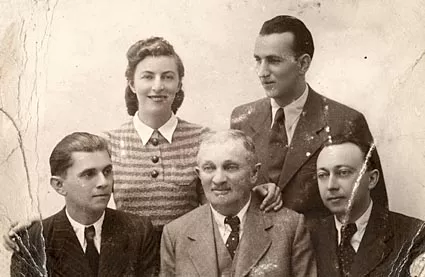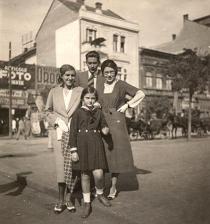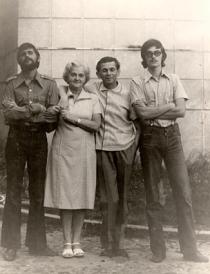The Diamantsteins
My husband's family, the Diamantsteins are in this picture. In the center of the first row that's my father-in-law, Jakab Diamantstein. On the left that's my husband's eldest brother, Miklos, on the right that's my husband Imre, behind him that's his second elder brother Istvan (Pista) and his wife Anna Szucs. They look like newly wed, I didn't know them yet. They probably came to visit dad, because my husband's second elder brother, Pista, was living in Bucharest with his wife.
My husband was originally from Deva, and his father, Jakab Diamantstein, was a merchant, but I didn't know my father-in-law personally. They were three brothers. At first my father-in-law and his family lived in Deva, they had a store there and I believe they went bankrupt already in 1935, so they came home to Vasarhely to reunite the family, because there were several brothers of my father-in-law living here. As far as I know, my husband's elder brother worked in Arad for a while, in the so-called Neumann factory, it was a famous, big factory in Arad. Later he ended up in Vasarhely and he had some interest in the Diamantstein ironware store. It was a family matter, as far as I know, and he did the book-keeping, the old man didn't work, he was too old for that.
My husband's mother - I don't remember her name - fell ill and died in 1939, so the old man, my husband and his elder brother Miklos lived together. Pista got married young and he moved to Bucharest. So the three of them were at home. Miklos was a very cultured, serious man, he was single, he never got married because he wasn't entirely healthy, he had problems with his thyroid gland. My father-in-law and his elder son were deported, they perished there. His younger brother Pista was also a clerk in Bucharest. His wife Anna Szucs was a commercial artist and had a very nice studio there. They didn't' get to be deported because they lived in Bucharest and so they survived the Holocaust. They weren't religious at all, they had a daughter who was born after ten years of marriage, and than they emigrated to Israel, and then to Canada together with the youngsters. My brother-in-law died two years ago [in 2002], at the age of 91, while my sister-in-law Anna still lives there.
In the meantime my husband graduated law school in Kolozsvar and worked here in Vasarhely at a law office as articled clerk, in Dr. Gusztav Hirsch's law office, until he was taken to forced labor. My husband's family was very religious, moreover, my husband used to pray even at home each morning, following the prescriptions. They weren't Orthodox Jews, but they were observant and used to go to the Orthodox and not the Neolog synagogue. They had no payes and such, but all the Diamantsteins, because there were many Diamantsteins in Vasarhely, were all religious.
My husband was in a terrible place for forced labor, they took them to the swamps of Pripet, which, as far as I know, is in today's Ukraine [Editor's note: Also known as the Pripyat swamps, it is the largest swamp in Europe, covering Southern Belorussia and Northern Ukraine. On 12th August 1941 6,526 Jews accused of theft were shot there. They wanted to sink the women and children into the swamp, but it turned out it wasn't swampy enough. www.jewishvirtuallibrary.org/jsource/Holocaust/Pripet.] He was there with Naci Rosenblatt, and they marched over a thousand kilometers, and, almost miraculously, he came back safe and sound. It was in November 1994, at the age of 29, when he got home in rags from forced labor. He had a near touch, even though he was a slim figure, but it looks like he was very resistant in the extreme misery. Unfortunately all those who came back from that hell stopped being religious, because the holidays were family holidays and they had no families anymore, none of them had.























